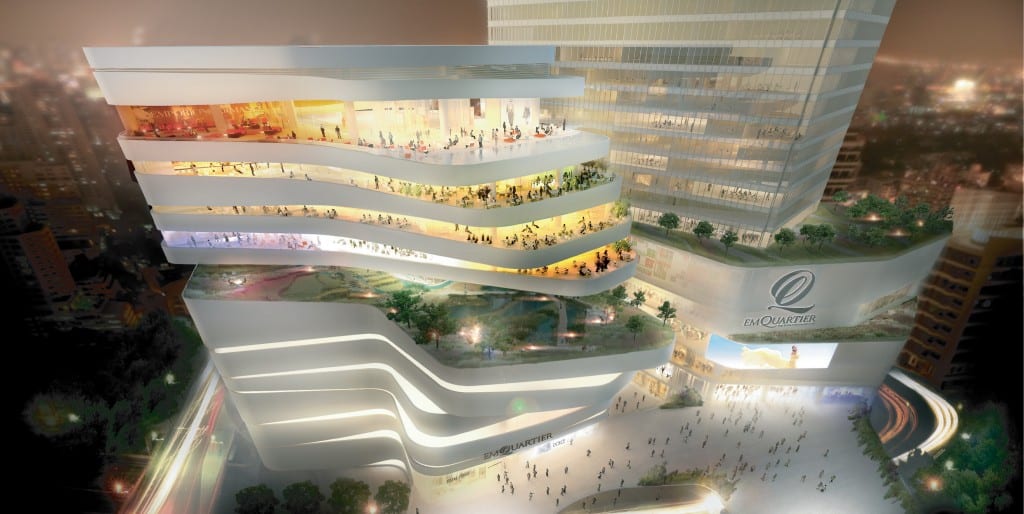
Among the small circle of mall developers in Bangkok, the default motto has been “the more, the better”. In a city already teeming with over 120 malls, International property consultant CB Richard Ellis says one million square metres of retail space is expected to be completed here this year. Bangkok ranks eighth among the top retail target markets in Asia-Pacific, according to its report.
As the malls take up vast swaths of land in prime areas, Bangkok risks losing its poignant charms to be just another city with high-rise buildings. Residents have taken up the cause with the Makassan Hope group petitioning the Bangkok Metropolitan Administration to refrain from selling huge plots of state land in the central district to developers.
There has also been much buzz about the popular street food court on Sukhumvit Soi 38, which will soon make way for condominium blocks.
Despite that sentiment, Supaluck Umpujh, one of three retail queens who oversaw the development of EmQuartier, says residents have much to gain from modern shopping malls built on the one-stop lifestyle centre model.
Malls featuring cinemas, restaurants, stores and mini parks provide relief for urban dwellers living in crowded conditions in high-rises, she says.
“Many people live in condos and they need a place to go out and enjoy social life. You can come to the mall to hang out, get a haircut, send your kid to a learning centre and watch a movie.
“We are not just building a mall, we are building up a district, that’s our aim,” says the vice chairwoman of The Mall Group.
EmQuartier is part of the master plan for Em District, which encompasses a 650,000m2 retail zone with three shopping complexes.
Since its recent launch, the mall has come up with various marketing gimmicks including Pharrell Williams’s flash mob dance by its Gourmet Market staff and the latest #iFeel Instagram campaign.
“A building can be elegant but cold inside. I want people to come to the mall feeling happy like it is their second home,” she says.
It is inevitable that more malls will be built, as the older malls with outdated designs and inadequate facilities no longer appeal to shoppers, she says.
Not just for Thais
As more malls are opening up, it is a wonder Thais have enough spending power as household debt keeps mounting.
However, Thailand’s reputation as a popular tourist destination provides a strong customer base.
“Previously, tourists came to Thailand for sightseeing but did not spend much money shopping. The government has introduced campaigns such as the Amazing Thailand Grand Sale to promote the country as a shopping destination,” she says.
The prices of luxury goods here may not be very competitive due to the high tax rate, but Bangkok offers cheaper accommodation than other cities like Hong Kong and Singapore.
“Bangkok can be the Dubai of the East with the number of world-class malls that we have,” she says.
The Chinese tourist boom and the launch of the Asean Economic Community later this year could further spur the growth of the retail industry in Thailand.
“Right now, the percentage of Chinese tourists who visit Thailand is still relatively small. Looking at the one billion population in China, there is huge potential to be tapped if more Chinese tourists visit Thailand,” she says.
Rise of the high-end culture
As the developer of Emporium, the first upscale mall in Bangkok, which opened its doors during the height of the 1997 economic crisis, Supaluck has weathered her share of the ups-and-downs in the retail market.
She is unperturbed when figures released by the Bank of Thailand show that retail sales fell from February to April compared to the same months last year.
“It’s part of life, this is a cycle. Currently, there is a global economic slowdown, many countries have their own problems. Even if the baht drops, we can expect to draw in more tourists, as you can see that the falling euro attracts more tourists to Europe.
“During the ’97 crisis, Thais travelled less to shop overseas and the lower baht attracted many tourists to Thailand. That was why we were able to do very well with Emporium,” she says.
The high-end consumer culture too looks to be gaining strength, judging from the rush of international luxury brands to set up flagship stores in Thailand. Jeweller Tiffany & Co and premium confectioner Pierre Herme opened their first outlets in EmQuartier recently.
“Thai society is status conscious and we are still a developing country. Everyone wants to dress well and look good,” says Supaluck, who first brought in Chanel and Hermes to Thailand.
While she is driven by the pioneer streak in her to introduce new brands to the local retail scene, she says international brands do not need much convincing, given the strong track record of Siam Paragon and Emporium under her helm.
“The brands also put much trust and confidence in Thailand as a tourist attraction. They are watching where the Chinese are going and see where is ‘the destination’.”

